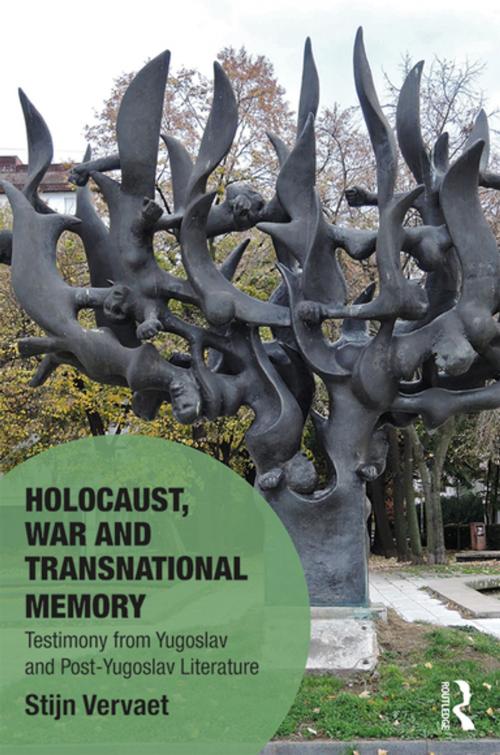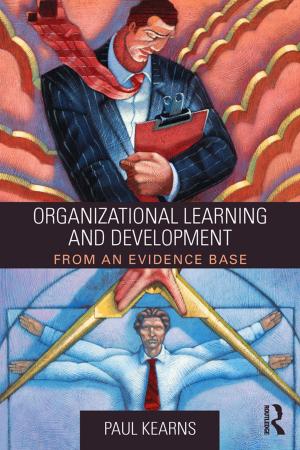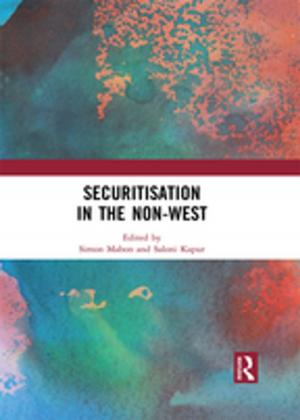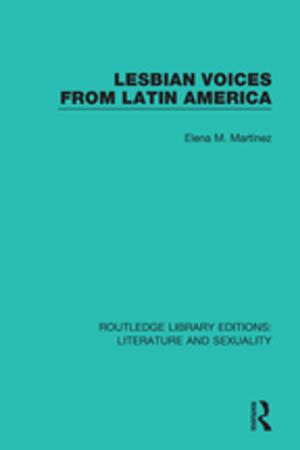Holocaust, War and Transnational Memory
Testimony from Yugoslav and Post-Yugoslav Literature
Nonfiction, Social & Cultural Studies, Social Science, Sociology| Author: | Stijn Vervaet | ISBN: | 9781317121411 |
| Publisher: | Taylor and Francis | Publication: | November 23, 2017 |
| Imprint: | Routledge | Language: | English |
| Author: | Stijn Vervaet |
| ISBN: | 9781317121411 |
| Publisher: | Taylor and Francis |
| Publication: | November 23, 2017 |
| Imprint: | Routledge |
| Language: | English |
Until now, there has been little scholarly attention given to the ways in which Eastern European Holocaust fiction can contribute to current debates about transnational and transgenerational memory. Yugoslav and post-Yugoslav literary narratives about the Holocaust offer a particularly interesting case because time and again Holocaust memory is represented as intersecting with other stories of extreme violence: with the suffering of the non-Jewish South-Slav population during the Second World War, with the fate of victims of Stalinist terror, and with the victims of ethnic cleansing in the Yugoslav wars of the 1990s.
This book examines the emergence and transformations of Holocaust memory in the socialist Yugoslav and post-Yugoslav eras. It discusses literary texts about the Holocaust by Yugoslav and post-Yugoslav writers, situating their oeuvre in the historical and discursive context in which it emerged and paying attention to its reception at the time. The book shows how in the writing of different generational groups (the survivor generation, the 1.5, and the second and third generations), the Holocaust is a motif for understanding the nature of extreme violence, locally and globally. The book offers comparative studies of several authors as well as readings of the work of individual writers. It uncovers forgotten authors and discusses internationally well-known and translated authors such as Danilo Kiš and David Albahari. By focusing on work by Jewish and non-Jewish authors of three generations, it sheds light on the ethical and aesthetical aspects of the transgenerational transmission of Holocaust memory in the Yugoslav context. As such, this book will appeal to both students and scholars of Holocaust studies, cultural memory studies, literary studies, cultural history, cultural sociology, Balkan studies, and Eastern European politics.
Until now, there has been little scholarly attention given to the ways in which Eastern European Holocaust fiction can contribute to current debates about transnational and transgenerational memory. Yugoslav and post-Yugoslav literary narratives about the Holocaust offer a particularly interesting case because time and again Holocaust memory is represented as intersecting with other stories of extreme violence: with the suffering of the non-Jewish South-Slav population during the Second World War, with the fate of victims of Stalinist terror, and with the victims of ethnic cleansing in the Yugoslav wars of the 1990s.
This book examines the emergence and transformations of Holocaust memory in the socialist Yugoslav and post-Yugoslav eras. It discusses literary texts about the Holocaust by Yugoslav and post-Yugoslav writers, situating their oeuvre in the historical and discursive context in which it emerged and paying attention to its reception at the time. The book shows how in the writing of different generational groups (the survivor generation, the 1.5, and the second and third generations), the Holocaust is a motif for understanding the nature of extreme violence, locally and globally. The book offers comparative studies of several authors as well as readings of the work of individual writers. It uncovers forgotten authors and discusses internationally well-known and translated authors such as Danilo Kiš and David Albahari. By focusing on work by Jewish and non-Jewish authors of three generations, it sheds light on the ethical and aesthetical aspects of the transgenerational transmission of Holocaust memory in the Yugoslav context. As such, this book will appeal to both students and scholars of Holocaust studies, cultural memory studies, literary studies, cultural history, cultural sociology, Balkan studies, and Eastern European politics.















